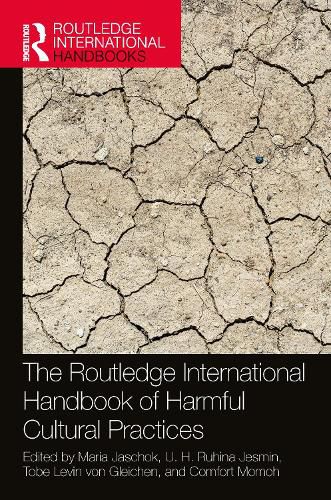Readings Newsletter
Become a Readings Member to make your shopping experience even easier.
Sign in or sign up for free!
You’re not far away from qualifying for FREE standard shipping within Australia
You’ve qualified for FREE standard shipping within Australia
The cart is loading…






This handbook looks at cross-cultural work on harmful cultural practices considered gendered forms of abuse of women. These include female genital mutilation (FGM), virginity testing, hymenoplasty, and genital cosmetic surgery. Bringing together comparative perspectives, intersectionality, and interdisciplinarity, it uses feminist methodology and mixed methods, with ethnography of central importance, to provide holistic, grounded theorizing within a framework of transformative research. Taking female genital mutilation, a topical, contested practice, and making it a heuristic reference for related procedures makes the case for global action based on understanding the complexity of harmful cultural practices that are contextually differentiated and experienced in intersectional ways. But because this phenomenon is enshrouded in matters of sensitivity and prejudice, narratives of suffering are muted and even suppressed, are dismissed as indigenous ritual, or become ammunition for racist organizing. Such conflicted and often opaque debates obstruct clear vision of the scale of both problem and solution.
Divided into six parts:
Comprised of 24 newly written chapters from experts around the world, this book will be of interest to scholars and students of nursing, social work, and allied health more broadly, as well as sociology, gender studies, and postcolonial studies.
$9.00 standard shipping within Australia
FREE standard shipping within Australia for orders over $100.00
Express & International shipping calculated at checkout
This handbook looks at cross-cultural work on harmful cultural practices considered gendered forms of abuse of women. These include female genital mutilation (FGM), virginity testing, hymenoplasty, and genital cosmetic surgery. Bringing together comparative perspectives, intersectionality, and interdisciplinarity, it uses feminist methodology and mixed methods, with ethnography of central importance, to provide holistic, grounded theorizing within a framework of transformative research. Taking female genital mutilation, a topical, contested practice, and making it a heuristic reference for related procedures makes the case for global action based on understanding the complexity of harmful cultural practices that are contextually differentiated and experienced in intersectional ways. But because this phenomenon is enshrouded in matters of sensitivity and prejudice, narratives of suffering are muted and even suppressed, are dismissed as indigenous ritual, or become ammunition for racist organizing. Such conflicted and often opaque debates obstruct clear vision of the scale of both problem and solution.
Divided into six parts:
Comprised of 24 newly written chapters from experts around the world, this book will be of interest to scholars and students of nursing, social work, and allied health more broadly, as well as sociology, gender studies, and postcolonial studies.